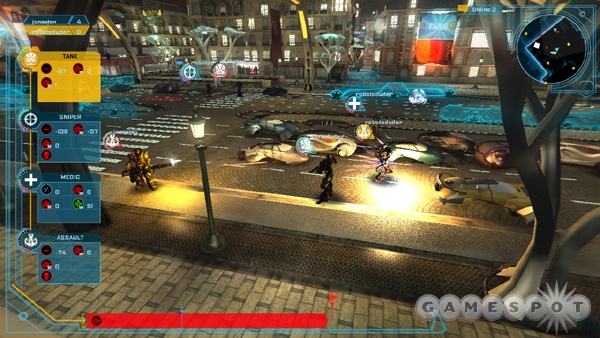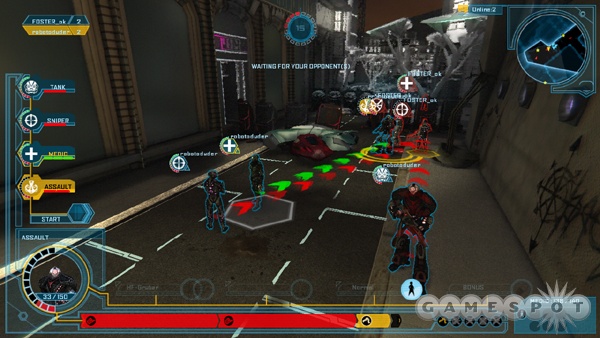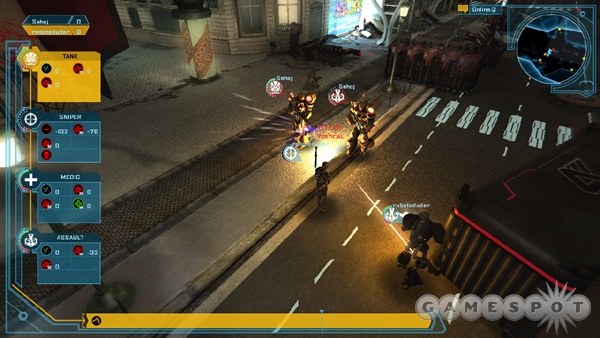It's always disappointing when cool concepts are killed by sloppy execution. The meticulously orchestrated chaos that erupts on the battlefield as squads of well-armed future soldiers duke it out in Fray's asynchronous turn-based encounters certainly appeals on a strategic level. But this multiplayer-only affair rapidly bleeds out its potential with only the lightest prodding. A sparse player community and an abundance of technical glitches spoil the satisfaction that comes from a match well played against a balanced opponent. Sadly, that scenario is such a rarity that it's tough to stick around long enough to reach those sporadic moments when everything feels like it's starting to click.

It's the year 2098, and three corporate factions vie for control of the planet. Rather than slaughtering each other in the real world, each side wages war in a holographic virtual realm by skirmishing with opposing groups of robotic sci-fi combatants that look like casting-call rejects for the nanosuit in Crysis. That's about as deep as the story goes, unfortunately, and while the gameplay itself is slightly more nuanced, it feels equally flimsy at times. The one inventive twist tied directly to the plot setup plays out in your choice of faction to support. Each corporation grants its troops a different perk, like bonus hit points or extra speed for your entire squad, and rallying behind your company of choice in battle after battle earns cumulative loyalty points that can be spent to unlock special upgrades for each class.
Selecting your patron corporation is a less tricky decision than picking your squad before every match. With only four slots available for your group and six character classes to pick from, expect to agonize a little over who makes the cut, since the precious experience points needed to access better gear and perks can be hard-earned. Units are decently balanced between the offensive-minded assault and tank classes, the sneakier sniper and shadow classes, and the backup support and medic classes. The inability to double up on any class is a shame, but it keeps matches from spiraling out of control. While they're so similar looking that their class icon is the only way to tell them apart sometimes, the warriors' distinct roles are clear-cut, and purchasing additional unlocked abilities and weaponry as you level up further differentiates and expands their usefulness.
It's not until you finally hit the virtual battlefield that things both heat up and fall apart. Matches begin with opposing sides deploying their troops across maps ranging from sprawling cityscapes to cramped laboratories. During the planning phase of each round, both sides queue up moves for individual squad members until all their action points are used up. When the preset timer ticks down or both sides are ready, the resolution phase kicks in, and all hell breaks loose. Bullets fly, strategies unfurl, bodies drop, fallen units respawn, and the next round kicks in. This repeats until the body count hits the designated quota or the round limit runs out and a victor is declared. There is indeed a certain thrill that comes with trying to strategize while anticipating your opponent's next move, particularly when your plans unfold in exciting, unexpected ways. Fray pulls off simultaneous tactical strategy decently enough, but it's rarely as smooth an experience as you find in other games that cover similar terrain.
Combat options feel too constrained initially, since you're limited to moving, attacking, switching weapons, and changing stances. Sure, a broader range of strategic possibilities open up as you unlock additional gear, weapons, and perks, yet there's nothing that really shines or stands out. Aside from the simultaneous nature of battle, everything looks and plays out generically. Fray has neither the depth nor charm of Frozen Synapse or X-COM. This style of gameplay has been done before and done better. It also doesn't help that Fray is a mess technically. A postlaunch patch may have cleared up most of the serious crashing issues reported by some users, but the game is still riddled with glitches and rough edges.

Units frequently walk through one another, face the wrong direction while they're moving, spray bullets without lifting their guns properly, and even randomly spin their entire upper torsos around. The clunky interface isn't always responsive either, and some commands don't register properly on the first try. For example, it's frustrating when you're trying to attack foes, but clicking on them triggers a command to walk up to them instead, no matter how many times you retry it. Wrestling with and undoing sporadic wonky orders detracts from the flow of combat and makes it easy to trip up, wasting precious time in the process as the turn counter clicks down.
Taming the twitchy camera to get a good view of the action is equally problematic, and it's disorienting when it snaps back to a less-than-ideal default position after each turn. The mini-map is poorly implemented, and it sometimes jumps to random points far away, making it a real challenge to work your way back to the action in time. Then there are the moments when the game stutters and hangs for a few seconds when transitioning between turns or right before victory is triggered. All of these issues both major and minor add up to make Fray feel much more like a work-in-progress beta than a retail-ready release.

Since multiplayer is the main show, the only show really, Fray's lack of proper matchmaking is bizarre. Without any means of setting restrictions on your opponents' levels, matches tend to be ridiculously easy or absurdly hard, and that's if you can find someone willing to play you. There's rarely more than one open game going at a time and only a dozen or so folks lurking in the menu chatroom, limiting the pool of available opponents to whomever you can coerce into battle. Once the action begins, higher-level players grind your four-man crew to a gritty pulp, making it frustrating to win matches, gain experience, and progress enough to unlock new kits for your posse. Or you wind up bowling over a weaker opponent with ease. The fact that there are so few people playing the game at any given time makes this even more aggravating.
But on the rare occasions when you do face off against an evenly matched foe, and the glitch gremlins at work behind the scenes decide to take a momentary lunch break, Fray has the potential to slip into a steady groove and become engrossing enough to make its shortcomings temporarily fade to the background like distant white noise. Matches can be a lot of fun, though it takes a near perfect storm of conditions to make them so. Numerous technical burps and hiccups are unwelcome distractions that stick to Fray like a stepped-on piece of chewed gum. They're a nuisance that adds unpleasant bulk to the game's more generic moments and make it feel unfinished.
